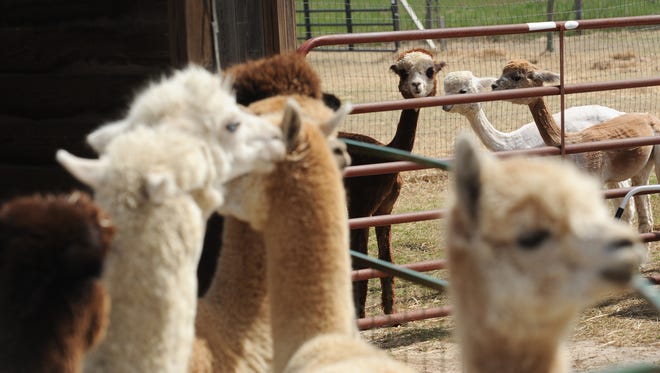Meet the 'da Vinci of shearing' at Va. alpaca farm
Jay Mariacher loves his job so much he has a tattoo of shearing blades on his arm.

The dozen or so people gathered for shearing day at By the Bay Alpacas farm greeted the arrival of alpaca shearing expert Jay Mariacher on Thursday with a cheer.
The Pungoteague, Virginia, farm, owned by Tara King and Andrew Leach, is home to nearly two dozen alpacas, each of which gets a once-a-year-haircut in the spring from Mariacher.
The shearer — who identifies so much with his work that seven years ago, he got a tattoo of shearing blades on his arm — lives in New Hampshire and annually travels up the East Coast to ply his trade.
"We get as far as Charleston, South Carolina, and work our way back and forth; we're running circles in Virginia for about five weeks," Mariacher said.
He is also contracted to shear alpacas at one of the largest alpaca shows in the country, which is held in Harrisburg, Pennsylvania, in April.
Last year, Mariacher sheared just under 5,000 alpacas in about four months during his travels.
"I really think we're going to top that this year," he said.
First to be shorn in Pungoteague were not the alpacas, but two Hog Island sheep owned by wildlife rehabilitator Gay Frazee.
She calls Mariacher "the da Vinci of shearing."
Kids in the classroom — but not the human kind?
Named Hannibel and Clarice after characters in the novel "Silence of the Lambs," the twin sheep were raised by Frazee from age 3 weeks after she found them at a local livestock swap.
For the past three years, King and Leach have invited Frazee to bring the sheep from her Jamesville home to the farm for their annual haircut.

After the sheep were trimmed, it was on to the main event: shearing the alpaca herd, which includes animals with coats of several different shades. Each animal also gets its hooves and teeth trimmed.
Mariacher, who has received multiple awards for his shearing prowess, was assisted by James Ross of Scotland, Connecticut, and Chris Destremps of Rhode Island as one after another, the alpacas went under the shears, including the farm's six-time champion, By the Bay's Bristol.
It is Ross' second year working with Mariacher, who taught him the art of shearing. He has a herd of 17 alpacas himself back in Connecticut, which they will shear in mid-May.
As the shearers removed each animal's coat, the blanket — the best section of fiber cut from one animal — was carefully wrapped in a sheet and tagged with the alpaca's name by some of the farm's helpers, while others gathered the less-valuable leg and neck fiber separately in bags.
King will enter some of the finest blankets to be judged in shows. Other fiber will be made into yarn or into roving, from which handspinners can make their own yarn.
King also uses the fiber from their herd to create unique items for the farm store including hats, scarves, fingerless gloves, handbags, baby seaters, pillows and other items. Photographs of some of her creations can be viewed on the farm's Facebook page, By the Bay Alpacas.
On Twitter @cvvaughnESN
757-787-1200, ext. 115